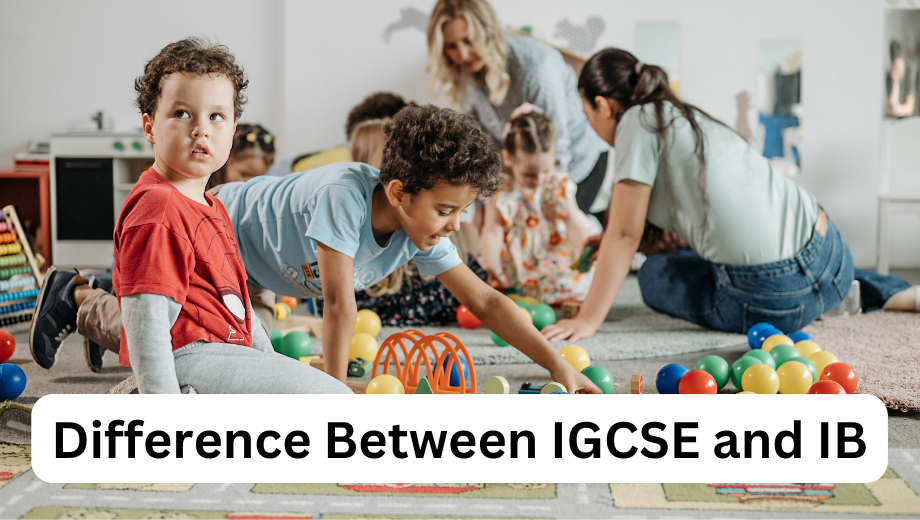
What is the difference between IGCSE and IB?
February 6, 2025
The International General Certificate of Secondary Education (IGCSE) and the International Baccalaureate (IB)are two internationally recognized curricula, but they cater to different age groups, learning styles, and objectives. Here’s a comprehensive comparison:
1. Governing Bodies
IGCSE:
- Administered by Cambridge Assessment International Education (CAIE) or other boards like Edexcel.
- Designed as a two-year program for students typically aged 14–16 (Grades 9–10).
IB:
- (International Baccalaureate): Offered by the International Baccalaureate Organization (IBO).
- Includes multiple programs: Primary Years Programme (PYP), Middle Years Programme (MYP), Diploma Programme (DP) (for ages 16–19), and the Career-related Programme (CP).
2. Target Age Group
IGCSE:
- Primarily for students aged 14–16, equivalent to Grades 9–10.
- Serves as a preparation for further education, such as A-Levels, IB DP, or other advanced programs.
IB:
- A broader educational framework covering students aged 3–19:
- IB DP (16–19 years): Equivalent to high school final years, preparing students for university.
- IB MYP (11–16 years): Overlaps slightly with the IGCSE in age group but emphasizes inquiry-based learning.
3. Curriculum Structure
IGCSE:
- Subject Choice: Students can choose from over 70 subjects, divided into core and elective categories.
- Flexibility: No mandatory core curriculum; students tailor their subject choices to their interests.
- Focus Areas: Practical learning, subject-specific knowledge, and foundational preparation for advanced studies.
IB:
- Holistic Approach: IB DP has six subject groups (Language & Literature, Language Acquisition, Individuals & Societies, Sciences, Mathematics, and Arts), with some compulsory subjects.
- Core Components: Includes Theory of Knowledge (TOK), Extended Essay (EE), and Creativity, Activity, Service (CAS).
- Interdisciplinary: Encourages connections between subjects, critical thinking, and global citizenship.
4. Teaching and Learning Approach
IGCSE:
- Content-Driven: Focuses on subject knowledge and its application.
- Practical and Flexible: Assessment includes coursework, practicals, and final exams.
- Preparation: Prepares students for national and international curricula (e.g., A-Levels, IB DP).
IB:
- Inquiry-Based Learning: Promotes exploration, independent research, and critical thinking.
- Holistic Education: Balances academics with personal development through CAS and TOK.
- Skills-Oriented: Emphasis on research, analysis, and global perspectives.
5. Assessment and Grading
IGCSE:
- Assessment: Combines written exams, oral exams, coursework, and practicals.
- Grading: Letter grades (A* to G) or 9–1 scale (depending on the board). Students can opt for Core or Extended levels.
IB:
- Assessment: Includes internal assessments, essays, presentations, and written exams.
- Grading: Points-based system (1–7 per subject) with a maximum score of 45 (including 3 core points from EE and TOK).
6. Recognition
IGCSE:
- Recognized worldwide as equivalent to high school certifications like GCSEs or Grade 10 qualifications.
- Serves as a stepping stone for advanced programs like IB DP, A-Levels, or national boards.
IB:
- The IB Diploma Programme is highly regarded by universities globally, especially in the US, UK, Canada, and Europe.
- Valued for its rigor, interdisciplinary approach, and focus on global citizenship.
7. Focus Areas
IGCSE:
- Academic Specialization: Focus on subject mastery and foundational skills.
- Prepares students for specific academic and career paths.
IB:
- Holistic Development: Emphasizes critical thinking, community service, and interdisciplinary learning.
- Designed to nurture well-rounded individuals prepared for university and life beyond academics.
8. Cost
IGCSE:
- Typically more affordable than IB, though costs vary by school.
- Exam fees are charged per subject, making it slightly more flexible.
IB:
- Generally more expensive due to its comprehensive framework and teacher training requirements.
- Offered mainly by International schools with higher tuition fees.
Summary
| Aspect | IGCSE | IB |
| Age Group | 14–16 years | 3–19 years (IB DP: 16–19 years) |
| Focus | Subject knowledge and flexibility | Holistic development and inquiry |
| Assessment | Exams and coursework | Continuous and final assessments |
| Recognition | Prepares for advanced programs | Direct university preparation |
| Cost | Moderate | High |
IGCSE is best suited for students seeking flexibility in subject choices and a foundation for advanced studies.
IB offers a more comprehensive and rigorous program for students aiming for well-rounded personal and academic growth, especially if targeting global university admissions.


